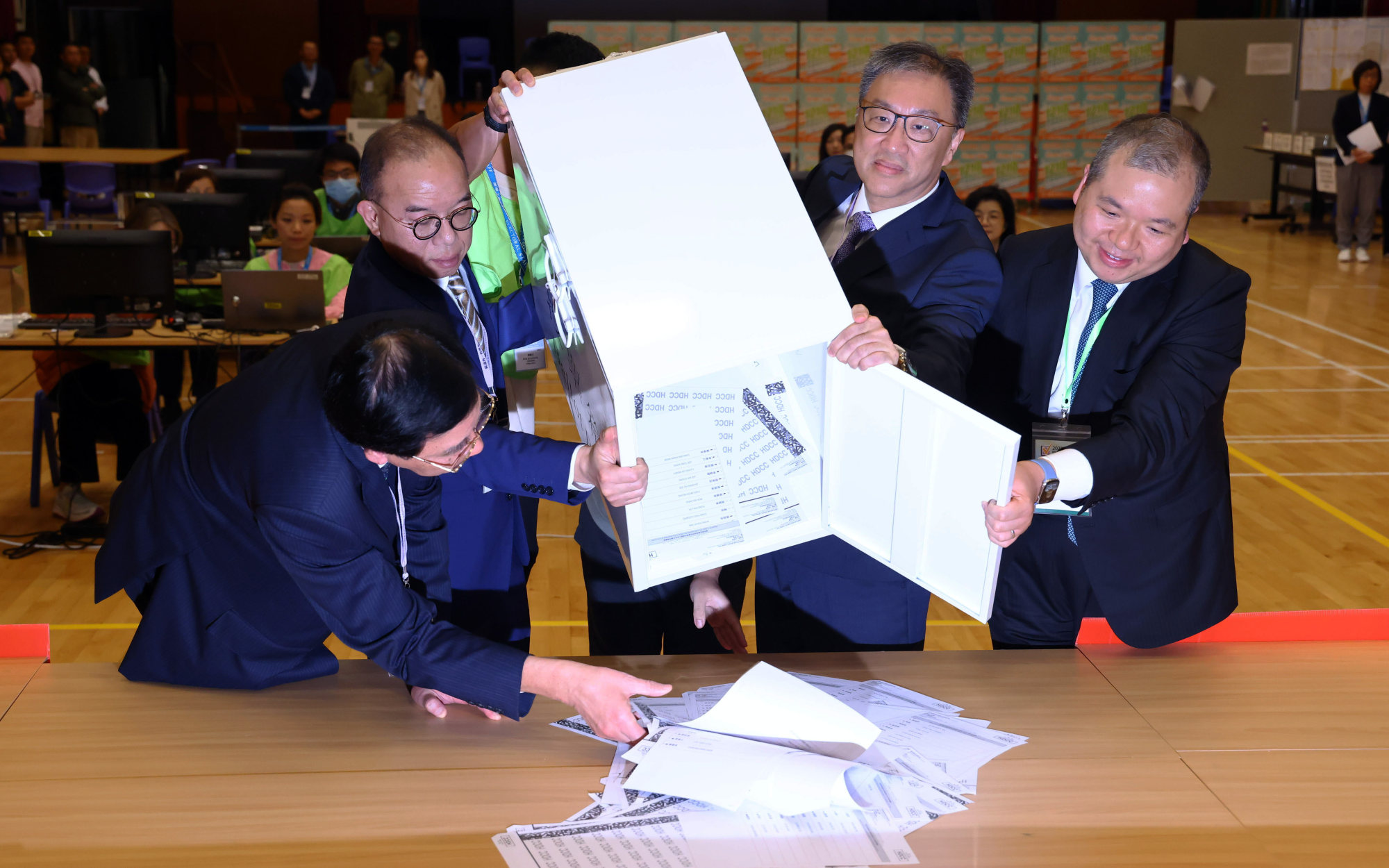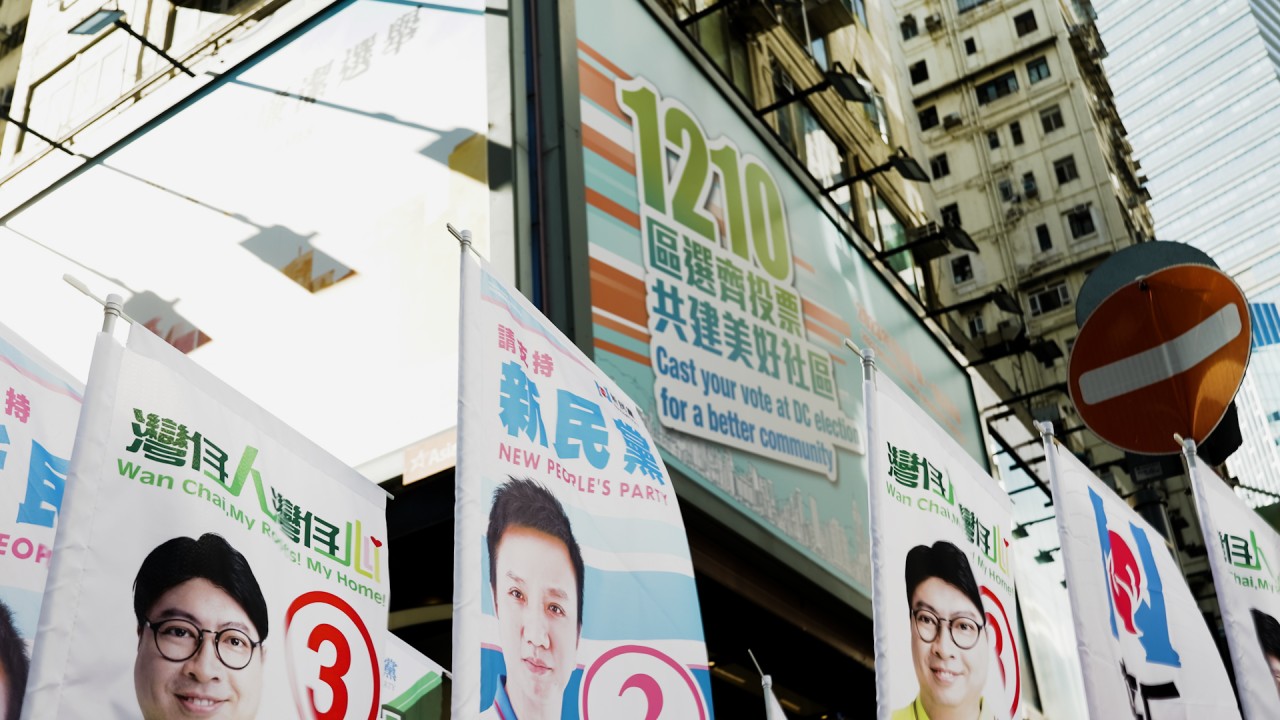
Low turnout at Hong Kong district council election: will Beijing be happy with result or will voter apathy be a problem in the future?
- Participation rate hits record low 27.54 per cent, but pro-establishment heavyweights say they are confident the turnout will not disappoint Beijing
- ‘Low turnout does impact the legitimacy of the councils,’ says academic
Despite officials’ strenuous efforts to get people to vote, many insisted they were not too troubled by the turnout of 27.54 per cent, or about 1.2 million residents, especially when compared with the historic high of 71.2 per cent in 2019 during the height of the anti-government protests.
Pro-establishment heavyweights told the Post they were confident the turnout rate would not disappoint Beijing, as it was comparable to that of the overhauled Legislative Council election in 2021 and it was well expected that the absence of the entire opposition camp would discourage supporters from voting.
Hong Kong logs record low 27.5% turnout for district council election
The figures for participation released on Monday morning, after hours of delay due to a computer system failure, were the lowest by a sizeable margin since Hong Kong’s return to China in 1997. The previous low, 35.8 per cent, was recorded in 1999. In 2015, the figure climbed up to 47 per cent.
In the city’s first-and-only direct election following Beijing’s overhaul – the 2021 poll for the Legislative Council – voter turnout stood at 30.2 per cent.
“Low turnout does impact the legitimacy of the councils,” said emeritus professor John Burns, who specialises in public administration at the University of Hong Kong.
“The government’s unprecedented campaign to mobilise us to vote could have worked both ways: encouraging some, but turning off others … This is mobilised participation and is of relatively little value for increasing the legitimacy of institutions like the district councils.”
He referred to the government’s first-time efforts to hold concerts and events on the eve of the election to encourage people to stay in the city to vote, offering funding to homes for the elderly for arranging transport for residents, and giving out thank you cards to voters.
The 180,000-strong civil service had also been strongly urged to vote, with at least three government workers from different departments telling the Post that they had to report to supervisors on whether they had done so.
But Ma Chi-sing, chairman of the Government Employees Association, said on Sunday that there was no such pressure on civil servants and they were not required to tell their supervisors anything.
Veteran political commentator Sonny Lo Shiu-hing said the all-out efforts by the government did not significantly boost turnout because the promotional message appeared to be too monotonous – just to remind people to vote on Sunday.
“What about the redrawn boundaries? Candidates’ background and platforms? Many electors might find them confusing even if they are supporters of the pro-Beijing camp,” he said.
As it happened: Hong Kong district council poll ends after 1½-hour extension
On Sunday, registered voters decided on 88 out of 470 seats in the 18 revamped district councils, seen as newly tooled to focus on community rather than direct political work.
Looking ahead, Lo said a major challenge facing the winning candidates would be how they would differentiate themselves from other councillors from within the same bloc by “engaging the people and making them feel relatable” towards concrete policy proposals.
Competition was now going to be intra-camp, in the absence of the common enemy, the opposition, Lo pointed out.
He added that if voter apathy was not tackled in a timely manner by the authorities, district governance would be affected as residents would not be engaged about their community. Infighting of political groups within the same camp in a bid to stand out would also hurt social harmony especially as the next Legco election would be held in 2025, he said.
Hong Kong’s revamped district council poll reflects political tale of two cities
But Lau Siu-kai, a consultant for semi-official Beijing think tank the Chinese Association of Hong Kong and Macau Studies, said the turnout was not an important indicator to determine the success of Sunday’s vote.
“[Beijing] already expected that barring opposition figures from running the election could lead to a boycott by some supporters of the camp,” he said.
“Now, they make up a significant proportion of the electors … But the pro-Beijing force will grow as the administration delivers results. The turnout in future elections will improve.”

Echoing the view, former Legislative Council president Jasper Tsang Yok-sing said he did not believe the turnout would disappoint Beijing.
He said it would be satisfactory if the overall turnout almost matched that of the 2021 vote.
Candidate Chris Ip Ngo-tung of the Democratic Alliance for the Betterment and Progress of Hong Kong (DAB) attributed the lukewarm response from voters to the overhauled election rules.
Cross-border voters praise Hong Kong government efforts to help them cast ballots
“Our voters may have to learn the new rules, so it might be difficult to have a very high percentage,” Ip, the secretary general of the DAB, said while canvassing in Jordan.
He beat five rivals to win a seat in the Yau Tsim Mong South constituency.
Defending the government’s campaign to drum up voter interest, the city’s No 2 official, Chief Secretary Eric Chan Kwok-ki, said the pre-election day events were held to “make residents happy” and let them understand the importance of voting, rather than to boost the turnout.
Authorities had yet to work out the costs of the events, he said, insisting it was money well spent as the election mattered to both residents and society.
Additional reporting by Harvey Kong, Willa Wu and Sophie Chew.


